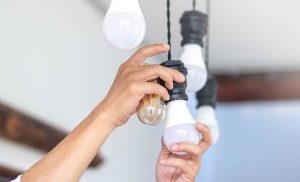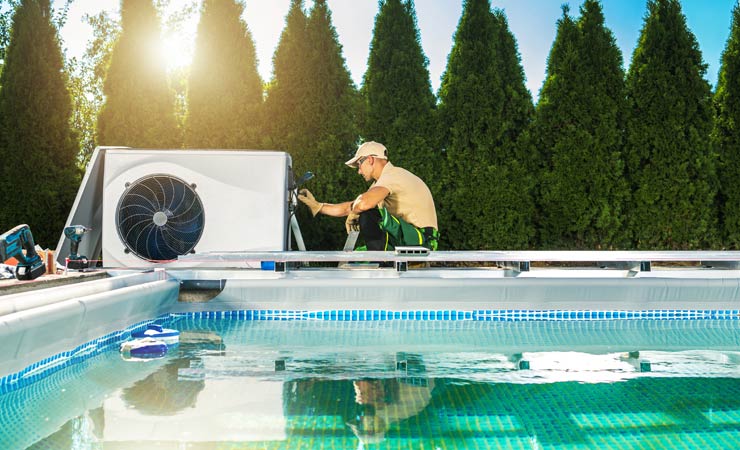
Choosing the right pool heater is an essential aspect for all pool owners who want to enjoy a comfortable swimming experience all year round. Whether it's about extending the swimming season or ensuring warm swimming pleasure on cooler days, an efficient and suitable pool heater can make the difference.
Pool owners are often faced with a wide variety of options: from solar heaters to heat pumps to gas or electric heaters. Each type of heating offers specific advantages and disadvantages and suits different needs and environments.
This article is dedicated to presenting different pool heating variants as well as crucial criteria that should be taken into account when selecting a suitable pool heating system. The aim is to identify the ideal solution for heating the pool.
Different types of pool heaters
Choosing a suitable pool heater is crucial to ensure swimming pleasure in the pool at any time of the year. Depending on personal preferences, environmental conditions and budget, various heating systems are available: solar pool heaters, heat pumps and gas or electric heating systems.
Each of these systems has its specific advantages and limitations, which must be evaluated in light of individual requirements and given circumstances.
These different heating systems are examined in more detail below.

Solar pool heater
Purchasing solar pool heaters:
Installing a solar pool heater typically involves solar panels placed on the roof of the home or near the pool. These collectors absorb the sun's energy and transfer the heat to the pool water, which circulates through the collectors.
The cost of purchasing and installing can vary, but is usually higher than traditional heating systems. The exact costs depend on the size of the pool, the heating output required and local conditions.
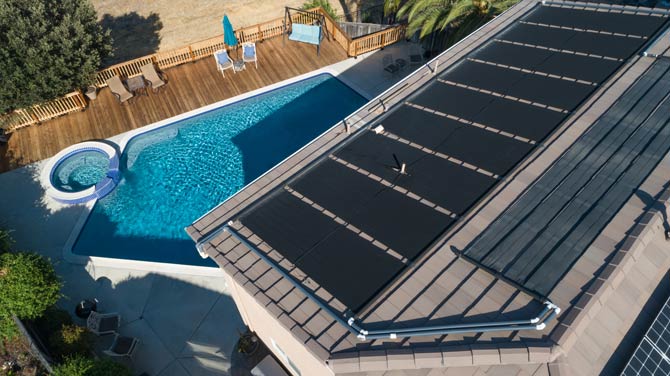

Advantages of solar pool heaters:
- Environmental friendliness: Solar heaters use renewable energy, making them an environmentally sustainable choice.
- Low operating costs: After installation, there are hardly any running costs because the energy comes from the sun.
- Longevity: Solar systems often last longer than traditional heating systems and require less maintenance.
- Increased property value: Installing solar heating can increase the value of a property.
Disadvantages of solar pool heaters:
- Weather dependency: The effectiveness depends heavily on the intensity of the sun's rays. On cloudy days or in regions with less sunshine, the heating performance may be affected.
- Space requirement: Solar panels often require a lot of space, which can be a problem in urban areas or where space is limited.
- Slower heating: Compared to gas or electric heaters, it takes longer to heat up the water.
- Initial investment: The initial costs tend to be higher compared to other heating systems.
Heat pumps for pool heating
Purchase of heat pumps:
Installing a heat pump for your pool requires an initial investment that is typically higher than conventional heating methods.
The price varies depending on the size and performance of the pump as well as the specific requirements of the pool and location.
In addition to the purchase costs, the installation costs must also be taken into account, which depend on the complexity of the installation.
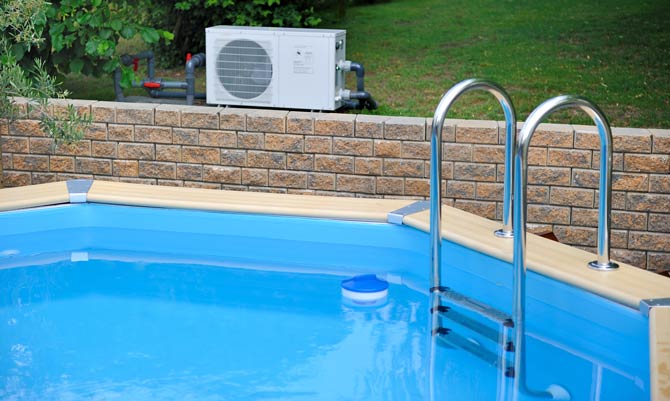

Advantages of heat pumps:
- High efficiency: Heat pumps utilize existing air heat, making them one of the most efficient heating methods for pools.
- Lower operating costs: In the long run, heat pumps can be more cost-effective because they require less energy to heat than traditional heating systems.
- Environmentally friendly: They produce fewer CO2 emissions than gas or oil heating.
- Durability: Typically, heat pumps have a longer lifespan and require less maintenance compared to other heating systems.
Disadvantages of heat pumps:
- Higher initial investment: The purchase costs are higher compared to other heating methods such as solar heaters or gas heaters.
- Temperature dependence: The performance of heat pumps can decrease at low outside temperatures.
- Slower heating: Compared to gas heaters, it takes longer to bring the water to the desired temperature.
- Space required for installation: Heat pumps require sufficient space for installation and should be placed in well-ventilated areas.
Gasbetriebene Poolheizung
Purchasing gas-powered pool heaters:
The purchase costs for a gas-powered pool heater vary depending on the size and power of the heater as well as the specific requirements of the pool.
As a rule, the initial investment for a gas heater is lower than for heat pumps or solar heaters.
However, when calculating, not only the costs for the heating itself, but also for the installation and any necessary gas pipes or tanks should be taken into account.
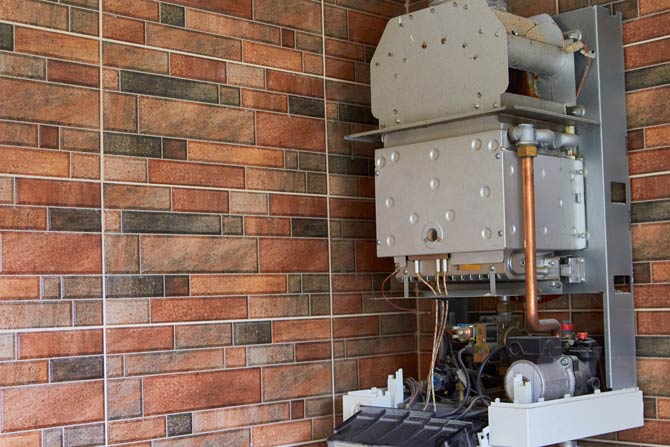

Advantages of gas-powered pool heaters:
- Fast heating: Gas heaters can bring pool water to the desired temperature very quickly, making them ideal for unexpected use or cool days.
- High performance: They are particularly suitable for large pools or pools in colder climates where a lot of heat is needed quickly.
- Flexibility: Gas heaters are independent of weather conditions and can be used all year round.
- Lower acquisition costs: Compared to other heating systems, the initial costs are often lower.
Disadvantages of gas-powered pool heaters:
- Higher operating costs: Running costs may be higher than other heating methods due to gas prices.
- Ecological damage: Gas heaters produce CO2 emissions, making them less environmentally friendly than solar or electric heaters.
- Maintenance effort: They require regular maintenance to stay safe and efficient.
- Dependence on gas supply: In areas without a gas connection, additional costs may arise for providing gas in the form of tanks.
Electric pool heater
Purchasing electric pool heaters:
Electric pool heaters are often cheaper to purchase than other heating systems such as gas heaters or heat pumps.
Installation costs are also usually lower as they are usually easier and quicker to install.
The exact cost varies depending on the heating capacity required and the specific requirements of the pool.
Advantages of electric pool heaters:
- Easy installation: Electric heaters are typically easy to install and do not require additional fuel or complex plumbing systems.
- Suitable for small pools: They are particularly effective for smaller pools or hot tubs where they can heat the water quickly.
- Low acquisition costs: The initial investment is often lower compared to other heating systems.
- Independence from weather conditions: Unlike solar heaters, electric heaters are not dependent on the weather.
Disadvantages of electric pool heaters:
- Higher operating costs: Running costs may be higher due to high power consumption, especially with frequent use.
- Less environmentally friendly: Depending on the power source, electric heaters may be less environmentally friendly than solar or gas heaters.
- Not ideal for large pools: For larger pools they are less efficient as they require more time to heat the entire volume of water.
- Dependence on electricity: They may be unreliable during power outages or in areas with unstable power supply.
Conclusion: Which pool pump is right for me
Choosing the right pool heater is an important aspect for the optimal swimming experience. The selection depends on personal preferences, environmental awareness and local climatic conditions. Modern heating systems offer a wide range of options, making it possible to find both environmentally friendly and efficient solutions.
The decision should therefore be made carefully to maximize the comfort and life of the pool.
Source: https://blogg.de/welche-poolheizung-passt-zu-mir/

